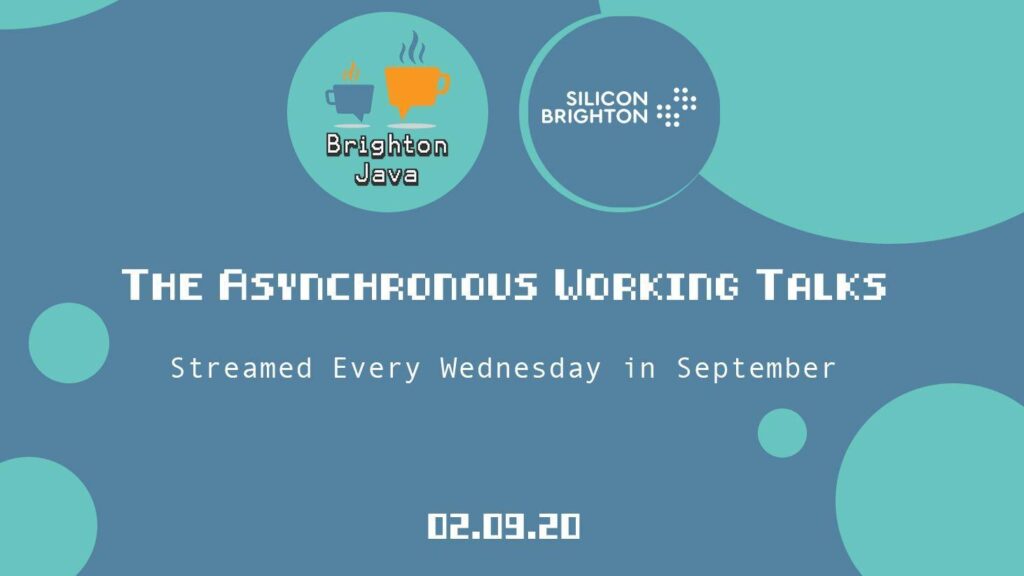
Brighton Java has been on hiatus during the pandemic. A lot of groups have gone online, but I was reluctant to do that, since most technical jobs already involve too many video calls these days. There is a lot of excellent material online and, for me, local meet-ups are all about being there in person. I wanted to make sure that any remote event we ran justified people’s time and attention.
Our first event this year, in association with Silicon Brighton, is a series of remote and asynchronous talks by James Stanier. James has been a supporter of Brighton Java for a long time and recently published Become an effective software engineer. On Wednesdays in September he has been providing a series of talks on remote asynchronous working.
So far, the first three talks in the series of five have been posted onto Youtube:
- Positive & Negative Effects of the Pandemic on the Tech Industry
- The Distributed Working Mindset
- Staying Connected by Communicating Deliberately
In his first talk, James looked at the current situation, and how the pandemic has forced people into home working. While times are difficult there is a possibility for producing useful long-term change. Remote work is now more prevalent, and some companies are switching to be more flexible than before (Brandwatch, where James is SVP Engineering, has gone remote-first).
James divided the responses to remote work into three groups – those who wanted to be in an office full time, those who wanted to be remote at all times, and those who wanted a sustainable mix of the two. Companies that can be flexible to people’s needs (for example childcare and health) open up a wider pool of talent.
I worked remotely with ribot, mixing my time between home, office, hotels, client sites and airports. Since the pandemic, I’ve been at home only, and I can see a definite advantage to having a base office. But I have also collaborated successfully with entirely remote colleagues, some of whom I never met in person. I believe that flexibility is vital in the modern world.
James himself is fully remote, and his experiences with this led into his second talk, about The Remote Mindset. This is the idea that if one colleague is remote, then companies should behave as if all of them are. James looked at a number of strategies around this. One example here was meetings, and how, if anyone is remote then everyone should interact via screens so there is a level playing field.
The practise of ‘broadcasting’ is also worth encouraging. This is the idea of leaving a public written trace of all smaller group discussions, particular the reasons for any decisions made. This sort of asynchronicity removes the need to be present at specific times. Recording meeting and providing good documentation makes companies more resilient. For example, someone who is ill can catch up easily.
Something else James said, which should be done more is the use of ‘spotters’ in meetings, to draw out people who have not spoken. I also think more companies would benefit by looking at how to make more of the scrum ceremonies asynchronous. I’ve always found the timing of a daily stand-up to be a point of friction.
The third talk looked at Staying Connected through Deliberate Communication. One thing lost through remote working is spontaneous interaction, the serendipity of casual in-person conversations. It’s not just a case of adding a burden of socialising through zoom. (I’ve pretty much stopped all non-work video calls).
James’s suggestions here included setting up informal one-to-one mentoring, and he described how this had been done at Branchwatch. He also made a strong case for connection people (asynchronously) through their passions, whether cooking, pets or exercise. Apparently teams at Brandwatch are competing to cover the distance between the Brighton and Boston offices. James also suggests explicit agenda-free “coffee break” get-togethers as part of the work day.
One of the things I love about these talks is that their form matches with their message. James has allowed the audience to choose topics for future talks, as well as answering specific questions. Some of these have been very useful such as how to handle colleagues who don’t turn on video, or tools for technical white-boarding.
The fourth talk will be live on Wednesday afternoon, on the topic of managing remote meetings. If you would like a reminder about it, please check the Meetup Page.